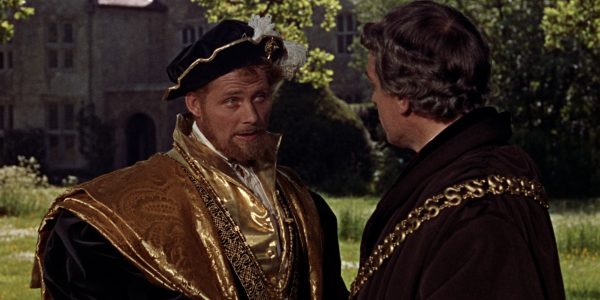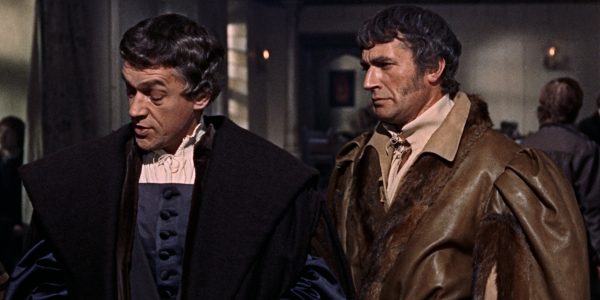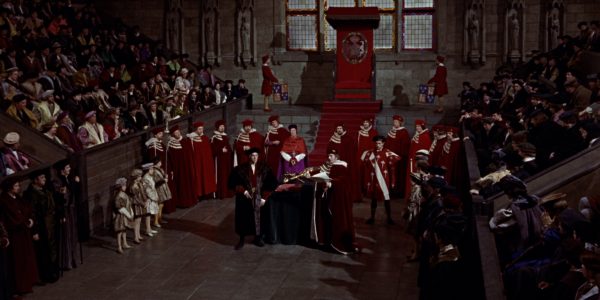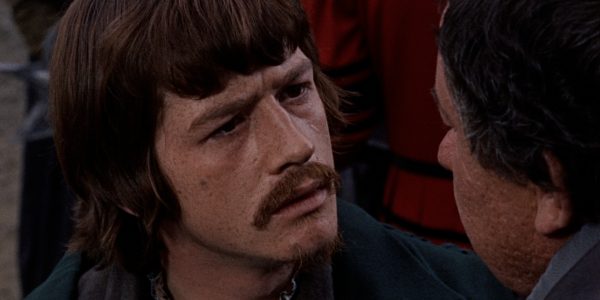Masters of Cinema Review: A Man for All Seasons
"This isn't Spain. This is England!"

Fred Zinnemann's critically acclaimed 1966 biographical drama
A Man for All Seasons (winner of six Academy Awards, including Best Picture, Best Director and Best Actor for Paul Scofield) has been restored as part of Eureka's The Masters of Cinema series. Despite a slow start, it is an excellent drama anchored by a great performance by Scofield.
Based on Robert Bolt's play of the same name (Bolt himself adapted it to the big screen),
A Man for All Seasons depicts the final years of Sir Thomas Moore (Scofield), who refused to sign a letter asking Pope Clement VII to annul King Henry VIII (Robert Shaw) of England's marriage to Catherine of Aragon and resigned as Lord Chancellor of England rather than take an Oath of Supremacy declaring Henry VIII Supreme Head of the Church of England.

The movie's version of Sir Thomas Moore is that of a tragic hero who steadfastly refused to go against his convictions and beliefs even if it meant going against a king. His meticulous understanding of the law allows him to carefully maneuver around questions of loyalty - he never makes an explicit statement about his position one way or the other, either publicly or in private, allowing his silence, which is not in defiance of any law, to speak for him.
Scofield is excellent as the genteel, but shrewd Moore, who knows how to make his opinion clear without ever saying it outright or even raising his voice. It is fascinating to watch him verbally spar with various state officials as they try to get him to agree with the king's demands or at least slip up and show a sign of open defiance. The man is even careful about what he says to his own family - when his wife presses him for the truth, he tells her that if she were to know and later be asked under oath, she would have to either lie or condemn him.
 A Man for All Seasons
A Man for All Seasons explores some very interesting questions about faith, loyalty and strength of conviction - most of Moore's peers readily agree to follow the king, but although he does not stand with them, Moore doesn't judge them for their actions. It is a matter of personal belief and not a stance against some grand injustice or wrongdoing. The movie doesn't paint Henry VIII or those who stood with them as being on the wrong side of history. To that end, an excellent supporting cast lends their talents alongside Scofield, including Orson Welles in a small, but memorable role as Cardinal Wolsey, a young John Hurt as the ambitious Richard Rich and Robert Shaw's brief turn as the forceful, rowdy Henry VIII.
The production is selectively lush and opulent - scenes of large, sprawling meetings, ceremonies or trials give an appropriate sense of grandeur and scale, as do many of the exteriors, but most of the action is contained within smaller, less glamorous spaces. The framing is very meticulous, guaranteeing that even the largest gathering never feels like a clutter on screen.
 A Man for All Season's
A Man for All Season's biggest fault is that it takes a while before it really takes off. While this is certainly not a story driven by urgency, many of the early scenes feel like they're dragging and it's not until Moore's first face-to-face meeting with the king that the story starts truly coming to life. By the end, it's certainly a gripping, compelling drama, but the slow start may be a barrier to some.
For the most part,
A Man for All Seasons is certainly a great historical drama that has successfully stood the test of time and is well worth seeing, or perhaps even revisiting for the special features included in The Masters of Cinema series, found below.
SPECIAL FEATURES
Commentary
The Life of Saint Thomas More – featurette
Original Theatrical Trailer
Masters of Cinema exclusive trailer
Booklet featuring new writing on the film.
Pros
- A compelling historical drama that has stood the test of time
- An excellent performance by Paul Scofield
Cons
- The slow start can be off-putting
 Fred Zinnemann's critically acclaimed 1966 biographical drama A Man for All Seasons (winner of six Academy Awards, including Best Picture, Best Director and Best Actor for Paul Scofield) has been restored as part of Eureka's The Masters of Cinema series. Despite a slow start, it is an excellent drama anchored by a great performance by Scofield.
Based on Robert Bolt's play of the same name (Bolt himself adapted it to the big screen), A Man for All Seasons depicts the final years of Sir Thomas Moore (Scofield), who refused to sign a letter asking Pope Clement VII to annul King Henry VIII (Robert Shaw) of England's marriage to Catherine of Aragon and resigned as Lord Chancellor of England rather than take an Oath of Supremacy declaring Henry VIII Supreme Head of the Church of England.
Fred Zinnemann's critically acclaimed 1966 biographical drama A Man for All Seasons (winner of six Academy Awards, including Best Picture, Best Director and Best Actor for Paul Scofield) has been restored as part of Eureka's The Masters of Cinema series. Despite a slow start, it is an excellent drama anchored by a great performance by Scofield.
Based on Robert Bolt's play of the same name (Bolt himself adapted it to the big screen), A Man for All Seasons depicts the final years of Sir Thomas Moore (Scofield), who refused to sign a letter asking Pope Clement VII to annul King Henry VIII (Robert Shaw) of England's marriage to Catherine of Aragon and resigned as Lord Chancellor of England rather than take an Oath of Supremacy declaring Henry VIII Supreme Head of the Church of England.
 The movie's version of Sir Thomas Moore is that of a tragic hero who steadfastly refused to go against his convictions and beliefs even if it meant going against a king. His meticulous understanding of the law allows him to carefully maneuver around questions of loyalty - he never makes an explicit statement about his position one way or the other, either publicly or in private, allowing his silence, which is not in defiance of any law, to speak for him.
Scofield is excellent as the genteel, but shrewd Moore, who knows how to make his opinion clear without ever saying it outright or even raising his voice. It is fascinating to watch him verbally spar with various state officials as they try to get him to agree with the king's demands or at least slip up and show a sign of open defiance. The man is even careful about what he says to his own family - when his wife presses him for the truth, he tells her that if she were to know and later be asked under oath, she would have to either lie or condemn him.
The movie's version of Sir Thomas Moore is that of a tragic hero who steadfastly refused to go against his convictions and beliefs even if it meant going against a king. His meticulous understanding of the law allows him to carefully maneuver around questions of loyalty - he never makes an explicit statement about his position one way or the other, either publicly or in private, allowing his silence, which is not in defiance of any law, to speak for him.
Scofield is excellent as the genteel, but shrewd Moore, who knows how to make his opinion clear without ever saying it outright or even raising his voice. It is fascinating to watch him verbally spar with various state officials as they try to get him to agree with the king's demands or at least slip up and show a sign of open defiance. The man is even careful about what he says to his own family - when his wife presses him for the truth, he tells her that if she were to know and later be asked under oath, she would have to either lie or condemn him.  A Man for All Seasons explores some very interesting questions about faith, loyalty and strength of conviction - most of Moore's peers readily agree to follow the king, but although he does not stand with them, Moore doesn't judge them for their actions. It is a matter of personal belief and not a stance against some grand injustice or wrongdoing. The movie doesn't paint Henry VIII or those who stood with them as being on the wrong side of history. To that end, an excellent supporting cast lends their talents alongside Scofield, including Orson Welles in a small, but memorable role as Cardinal Wolsey, a young John Hurt as the ambitious Richard Rich and Robert Shaw's brief turn as the forceful, rowdy Henry VIII.
The production is selectively lush and opulent - scenes of large, sprawling meetings, ceremonies or trials give an appropriate sense of grandeur and scale, as do many of the exteriors, but most of the action is contained within smaller, less glamorous spaces. The framing is very meticulous, guaranteeing that even the largest gathering never feels like a clutter on screen.
A Man for All Seasons explores some very interesting questions about faith, loyalty and strength of conviction - most of Moore's peers readily agree to follow the king, but although he does not stand with them, Moore doesn't judge them for their actions. It is a matter of personal belief and not a stance against some grand injustice or wrongdoing. The movie doesn't paint Henry VIII or those who stood with them as being on the wrong side of history. To that end, an excellent supporting cast lends their talents alongside Scofield, including Orson Welles in a small, but memorable role as Cardinal Wolsey, a young John Hurt as the ambitious Richard Rich and Robert Shaw's brief turn as the forceful, rowdy Henry VIII.
The production is selectively lush and opulent - scenes of large, sprawling meetings, ceremonies or trials give an appropriate sense of grandeur and scale, as do many of the exteriors, but most of the action is contained within smaller, less glamorous spaces. The framing is very meticulous, guaranteeing that even the largest gathering never feels like a clutter on screen.  A Man for All Season's biggest fault is that it takes a while before it really takes off. While this is certainly not a story driven by urgency, many of the early scenes feel like they're dragging and it's not until Moore's first face-to-face meeting with the king that the story starts truly coming to life. By the end, it's certainly a gripping, compelling drama, but the slow start may be a barrier to some.
For the most part, A Man for All Seasons is certainly a great historical drama that has successfully stood the test of time and is well worth seeing, or perhaps even revisiting for the special features included in The Masters of Cinema series, found below.
SPECIAL FEATURES
Commentary
The Life of Saint Thomas More – featurette
Original Theatrical Trailer
Masters of Cinema exclusive trailer
Booklet featuring new writing on the film.
A Man for All Season's biggest fault is that it takes a while before it really takes off. While this is certainly not a story driven by urgency, many of the early scenes feel like they're dragging and it's not until Moore's first face-to-face meeting with the king that the story starts truly coming to life. By the end, it's certainly a gripping, compelling drama, but the slow start may be a barrier to some.
For the most part, A Man for All Seasons is certainly a great historical drama that has successfully stood the test of time and is well worth seeing, or perhaps even revisiting for the special features included in The Masters of Cinema series, found below.
SPECIAL FEATURES
Commentary
The Life of Saint Thomas More – featurette
Original Theatrical Trailer
Masters of Cinema exclusive trailer
Booklet featuring new writing on the film.